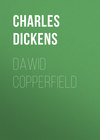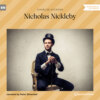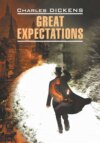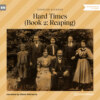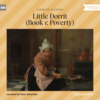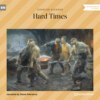Czytaj książkę: «The Old Curiosity Shop», strona 4
‘Here’s somebody for you,’ said the boy.
‘Who?’
‘I don’t know.’
‘Ask!’ said Quilp, seizing the trifle of wood before mentioned and throwing it at him with such dexterity that it was well the boy disappeared before it reached the spot on which he had stood. ‘Ask, you dog.’
Not caring to venture within range of such missles again, the boy discreetly sent in his stead the first cause of the interruption, who now presented herself at the door.
‘What, Nelly!’ cried Quilp.
‘Yes,’ said the child, hesitating whether to enter or retreat, for the dwarf just roused, with his dishevelled hair hanging all about him and a yellow handkerchief over his head, was something fearful to behold; it’s only me, sir.’
‘Come in,’ said Quilp, without getting off the desk. ‘Come in. Stay. Just look out into the yard, and see whether there’s a boy standing on his head.’
‘No, sir,’ replied Nell. ‘He’s on his feet.’
‘You’re sure he is?’ said Quilp. ‘Well. Now, come in and shut the door. What’s your message, Nelly?’
The child handed him a letter. Mr Quilp, without changing his position further than to turn over a little more on his side and rest his chin on his hand, proceeded to make himself acquainted with its contents.
CHAPTER 6
Little Nell stood timidly by, with her eyes raised to the countenance of Mr Quilp as he read the letter, plainly showing by her looks that while she entertained some fear and distrust of the little man, she was much inclined to laugh at his uncouth appearance and grotesque attitude. And yet there was visible on the part of the child a painful anxiety for his reply, and consciousness of his power to render it disagreeable or distressing, which was strongly at variance with this impulse and restrained it more effectually than she could possibly have done by any efforts of her own.
That Mr Quilp was himself perplexed, and that in no small degree, by the contents of the letter, was sufficiently obvious. Before he had got through the first two or three lines he began to open his eyes very wide and to frown most horribly, the next two or three caused him to scratch his head in an uncommonly vicious manner, and when he came to the conclusion he gave a long dismal whistle indicative of surprise and dismay. After folding and laying it down beside him, he bit the nails of all of his ten fingers with extreme voracity; and taking it up sharply, read it again. The second perusal was to all appearance as unsatisfactory as the first, and plunged him into a profound reverie from which he awakened to another assault upon his nails and a long stare at the child, who with her eyes turned towards the ground awaited his further pleasure.
‘Halloa here!’ he said at length, in a voice, and with a suddenness, which made the child start as though a gun had been fired off at her ear. ‘Nelly!’
‘Yes, sir.’
‘Do you know what’s inside this letter, Nell?’
‘No, sir!’
‘Are you sure, quite sure, quite certain, upon your soul?’
‘Quite sure, sir.’
‘Do you wish you may die if you do know, hey?’ said the dwarf.
‘Indeed I don’t know,’ returned the child.
‘Well!’ muttered Quilp as he marked her earnest look. ‘I believe you. Humph! Gone already? Gone in four-and-twenty hours! What the devil has he done with it, that’s the mystery!’
This reflection set him scratching his head and biting his nails once more. While he was thus employed his features gradually relaxed into what was with him a cheerful smile, but which in any other man would have been a ghastly grin of pain, and when the child looked up again she found that he was regarding her with extraordinary favour and complacency.
‘You look very pretty to-day, Nelly, charmingly pretty. Are you tired, Nelly?’
‘No, sir. I’m in a hurry to get back, for he will be anxious while I am away.’
‘There’s no hurry, little Nell, no hurry at all,’ said Quilp. ‘How should you like to be my number two, Nelly?’
‘To be what, sir?’
‘My number two, Nelly, my second, my Mrs Quilp,’ said the dwarf.
The child looked frightened, but seemed not to understand him, which Mr Quilp observing, hastened to make his meaning more distinctly.
‘To be Mrs Quilp the second, when Mrs Quilp the first is dead, sweet Nell,’ said Quilp, wrinkling up his eyes and luring her towards him with his bent forefinger, ‘to be my wife, my little cherry-cheeked, red-lipped wife. Say that Mrs Quilp lives five year, or only four, you’ll be just the proper age for me. Ha ha! Be a good girl, Nelly, a very good girl, and see if one of these days you don’t come to be Mrs Quilp of Tower Hill.’
So far from being sustained and stimulated by this delightful prospect, the child shrank from him in great agitation, and trembled violently. Mr Quilp, either because frightening anybody afforded him a constitutional delight, or because it was pleasant to contemplate the death of Mrs Quilp number one, and the elevation of Mrs Quilp number two to her post and title, or because he was determined from purposes of his own to be agreeable and good-humoured at that particular time, only laughed and feigned to take no heed of her alarm.
‘You shall come with me to Tower Hill and see Mrs Quilp that is, directly,’ said the dwarf. ‘She’s very fond of you, Nell, though not so fond as I am. You shall come home with me.’
‘I must go back indeed,’ said the child. ‘He told me to return directly I had the answer.’
‘But you haven’t it, Nelly,’ retorted the dwarf, ‘and won’t have it, and can’t have it, until I have been home, so you see that to do your errand, you must go with me. Reach me yonder hat, my dear, and we’ll go directly.’ With that, Mr Quilp suffered himself to roll gradually off the desk until his short legs touched the ground, when he got upon them and led the way from the counting-house to the wharf outside, when the first objects that presented themselves were the boy who had stood on his head and another young gentleman of about his own stature, rolling in the mud together, locked in a tight embrace, and cuffing each other with mutual heartiness.
‘It’s Kit!’ cried Nelly, clasping her hand, ‘poor Kit who came with me! Oh, pray stop them, Mr Quilp!’
‘I’ll stop ‘em,’ cried Quilp, diving into the little counting-house and returning with a thick stick, ‘I’ll stop ‘em. Now, my boys, fight away. I’ll fight you both. I’ll take both of you, both together, both together!’
With which defiances the dwarf flourished his cudgel, and dancing round the combatants and treading upon them and skipping over them, in a kind of frenzy, laid about him, now on one and now on the other, in a most desperate manner, always aiming at their heads and dealing such blows as none but the veriest little savage would have inflicted. This being warmer work than they had calculated upon, speedily cooled the courage of the belligerents, who scrambled to their feet and called for quarter.
‘I’ll beat you to a pulp, you dogs,’ said Quilp, vainly endeavoring to get near either of them for a parting blow. ‘I’ll bruise you until you’re copper-coloured, I’ll break your faces till you haven’t a profile between you, I will.’
‘Come, you drop that stick or it’ll be worse for you,’ said his boy, dodging round him and watching an opportunity to rush in; ‘you drop that stick.’
‘Come a little nearer, and I’ll drop it on your skull, you dog,’ said Quilp, with gleaming eyes; ‘a little nearer – nearer yet.’
But the boy declined the invitation until his master was apparently a little off his guard, when he darted in and seizing the weapon tried to wrest it from his grasp. Quilp, who was as strong as a lion, easily kept his hold until the boy was tugging at it with his utmost power, when he suddenly let it go and sent him reeling backwards, so that he fell violently upon his head. The success of this manoeuvre tickled Mr Quilp beyond description, and he laughed and stamped upon the ground as at a most irresistible jest.
‘Never mind,’ said the boy, nodding his head and rubbing it at the same time; ‘you see if ever I offer to strike anybody again because they say you’re an uglier dwarf than can be seen anywheres for a penny, that’s all.’
‘Do you mean to say, I’m not, you dog?’ returned Quilp.
‘No!’ retorted the boy.
‘Then what do you fight on my wharf for, you villain?’ said Quilp.
‘Because he said so,’ replied the boy, pointing to Kit, ‘not because you an’t.’
‘Then why did he say,’ bawled Kit, ‘that Miss Nelly was ugly, and that she and my master was obliged to do whatever his master liked? Why did he say that?’
‘He said what he did because he’s a fool, and you said what you did because you’re very wise and clever – almost too clever to live, unless you’re very careful of yourself, Kit.’ said Quilp, with great suavity in his manner, but still more of quiet malice about his eyes and mouth. ‘Here’s sixpence for you, Kit. Always speak the truth. At all times, Kit, speak the truth. Lock the counting-house, you dog, and bring me the key.’
The other boy, to whom this order was addressed, did as he was told, and was rewarded for his partizanship in behalf of his master, by a dexterous rap on the nose with the key, which brought the water into his eyes. Then Mr Quilp departed with the child and Kit in a boat, and the boy revenged himself by dancing on his head at intervals on the extreme verge of the wharf, during the whole time they crossed the river.
There was only Mrs Quilp at home, and she, little expecting the return of her lord, was just composing herself for a refreshing slumber when the sound of his footsteps roused her. She had barely time to seem to be occupied in some needle-work, when he entered, accompanied by the child; having left Kit downstairs.
‘Here’s Nelly Trent, dear Mrs Quilp,’ said her husband. ‘A glass of wine, my dear, and a biscuit, for she has had a long walk. She’ll sit with you, my soul, while I write a letter.’
Mrs Quilp looked tremblingly in her spouse’s face to know what this unusual courtesy might portend, and obedient to the summons she saw in his gesture, followed him into the next room.
‘Mind what I say to you,’ whispered Quilp. ‘See if you can get out of her anything about her grandfather, or what they do, or how they live, or what he tells her. I’ve my reasons for knowing, if I can. You women talk more freely to one another than you do to us, and you have a soft, mild way with you that’ll win upon her. Do you hear?’
‘Yes, Quilp.’
‘Go then. What’s the matter now?’
‘Dear Quilp,’ faltered his wife. ‘I love the child – if you could do without making me deceive her – ’
The dwarf muttering a terrible oath looked round as if for some weapon with which to inflict condign punishment upon his disobedient wife. The submissive little woman hurriedly entreated him not to be angry, and promised to do as he bade her.
‘Do you hear me,’ whispered Quilp, nipping and pinching her arm; ‘worm yourself into her secrets; I know you can. I’m listening, recollect. If you’re not sharp enough, I’ll creak the door, and woe betide you if I have to creak it much. Go!’
Mrs Quilp departed according to order, and her amiable husband, ensconcing himself behind the partly opened door, and applying his ear close to it, began to listen with a face of great craftiness and attention.
Poor Mrs Quilp was thinking, however, in what manner to begin or what kind of inquiries she could make; and it was not until the door, creaking in a very urgent manner, warned her to proceed without further consideration, that the sound of her voice was heard.
‘How very often you have come backwards and forwards lately to Mr Quilp, my dear.’
‘I have said so to grandfather, a hundred times,’ returned Nell innocently.
‘And what has he said to that?’
‘Only sighed, and dropped his head, and seemed so sad and wretched that if you could have seen him I am sure you must have cried; you could not have helped it more than I, I know. How that door creaks!’
‘It often does.’ returned Mrs Quilp, with an uneasy glance towards it. ‘But your grandfather – he used not to be so wretched?’
‘Oh, no!’ said the child eagerly, ‘so different! We were once so happy and he so cheerful and contented! You cannot think what a sad change has fallen on us since.’
‘I am very, very sorry, to hear you speak like this, my dear!’ said Mrs Quilp. And she spoke the truth.
‘Thank you,’ returned the child, kissing her cheek, ‘you are always kind to me, and it is a pleasure to talk to you. I can speak to no one else about him, but poor Kit. I am very happy still, I ought to feel happier perhaps than I do, but you cannot think how it grieves me sometimes to see him alter so.’
‘He’ll alter again, Nelly,’ said Mrs Quilp, ‘and be what he was before.’
‘Oh, if God would only let that come about!’ said the child with streaming eyes; ‘but it is a long time now, since he first began to – I thought I saw that door moving!’
‘It’s the wind,’ said Mrs Quilp, faintly. ‘Began to – ’
‘To be so thoughtful and dejected, and to forget our old way of spending the time in the long evenings,’ said the child. ‘I used to read to him by the fireside, and he sat listening, and when I stopped and we began to talk, he told me about my mother, and how she once looked and spoke just like me when she was a little child. Then he used to take me on his knee, and try to make me understand that she was not lying in her grave, but had flown to a beautiful country beyond the sky where nothing died or ever grew old – we were very happy once!’
‘Nelly, Nelly!’ said the poor woman, ‘I can’t bear to see one as young as you so sorrowful. Pray don’t cry.’
‘I do so very seldom,’ said Nell, ‘but I have kept this to myself a long time, and I am not quite well, I think, for the tears come into my eyes and I cannot keep them back. I don’t mind telling you my grief, for I know you will not tell it to any one again.’
Mrs Quilp turned away her head and made no answer.
‘Then,’ said the child, ‘we often walked in the fields and among the green trees, and when we came home at night, we liked it better for being tired, and said what a happy place it was. And if it was dark and rather dull, we used to say, what did it matter to us, for it only made us remember our last walk with greater pleasure, and look forward to our next one. But now we never have these walks, and though it is the same house it is darker and much more gloomy than it used to be, indeed!’
She paused here, but though the door creaked more than once, Mrs Quilp said nothing.
‘Mind you don’t suppose,’ said the child earnestly, ‘that grandfather is less kind to me than he was. I think he loves me better every day, and is kinder and more affectionate than he was the day before. You do not know how fond he is of me!’
‘I am sure he loves you dearly,’ said Mrs Quilp.
‘Indeed, indeed he does!’ cried Nell, ‘as dearly as I love him. But I have not told you the greatest change of all, and this you must never breathe again to any one. He has no sleep or rest, but that which he takes by day in his easy chair; for every night and nearly all night long he is away from home.’
‘Nelly!’
‘Hush!’ said the child, laying her finger on her lip and looking round. ‘When he comes home in the morning, which is generally just before day, I let him in. Last night he was very late, and it was quite light. I saw that his face was deadly pale, that his eyes were bloodshot, and that his legs trembled as he walked. When I had gone to bed again, I heard him groan. I got up and ran back to him, and heard him say, before he knew that I was there, that he could not bear his life much longer, and if it was not for the child, would wish to die. What shall I do! Oh! What shall I do!’
The fountains of her heart were opened; the child, overpowered by the weight of her sorrows and anxieties, by the first confidence she had ever shown, and the sympathy with which her little tale had been received, hid her face in the arms of her helpless friend, and burst into a passion of tears.
In a few minutes Mr Quilp returned, and expressed the utmost surprise to find her in this condition, which he did very naturally and with admirable effect, for that kind of acting had been rendered familiar to him by long practice, and he was quite at home in it.
‘She’s tired you see, Mrs Quilp,’ said the dwarf, squinting in a hideous manner to imply that his wife was to follow his lead. ‘It’s a long way from her home to the wharf, and then she was alarmed to see a couple of young scoundrels fighting, and was timorous on the water besides. All this together has been too much for her. Poor Nell!’
Mr Quilp unintentionally adopted the very best means he could have devised for the recovery of his young visitor, by patting her on the head. Such an application from any other hand might not have produced a remarkable effect, but the child shrank so quickly from his touch and felt such an instinctive desire to get out of his reach, that she rose directly and declared herself ready to return.
‘But you’d better wait, and dine with Mrs Quilp and me.’ said the dwarf.
‘I have been away too long, sir, already,’ returned Nell, drying her eyes.
‘Well,’ said Mr Quilp, ‘if you will go, you will, Nelly. Here’s the note. It’s only to say that I shall see him to-morrow or maybe next day, and that I couldn’t do that little business for him this morning. Good-bye, Nelly. Here, you sir; take care of her, d’ye hear?’
Kit, who appeared at the summons, deigned to make no reply to so needless an injunction, and after staring at Quilp in a threatening manner, as if he doubted whether he might not have been the cause of Nelly shedding tears, and felt more than half disposed to revenge the fact upon him on the mere suspicion, turned about and followed his young mistress, who had by this time taken her leave of Mrs Quilp and departed.
‘You’re a keen questioner, an’t you, Mrs Quilp?’ said the dwarf, turning upon her as soon as they were left alone.
‘What more could I do?’ returned his wife mildly.
‘What more could you do!’ sneered Quilp, ‘couldn’t you have done something less? Couldn’t you have done what you had to do, without appearing in your favourite part of the crocodile, you minx?’
‘I am very sorry for the child, Quilp,’ said his wife. ‘Surely I’ve done enough. I’ve led her on to tell her secret she supposed we were alone; and you were by, God forgive me.’
‘You led her on! You did a great deal truly!’ said Quilp. ‘What did I tell you about making me creak the door? It’s lucky for you that from what she let fall, I’ve got the clue I want, for if I hadn’t, I’d have visited the failure upon you, I can tell you.’
Mrs Quilp being fully persuaded of this, made no reply. Her husband added with some exultation,
‘But you may thank your fortunate stars – the same stars that made you Mrs Quilp – you may thank them that I’m upon the old gentleman’s track, and have got a new light. So let me hear no more about this matter now or at any other time, and don’t get anything too nice for dinner, for I shan’t be home to it.’
So saying, Mr Quilp put his hat on and took himself off, and Mrs Quilp, who was afflicted beyond measure by the recollection of the part she had just acted, shut herself up in her chamber, and smothering her head in the bed-clothes bemoaned her fault more bitterly than many less tender-hearted persons would have mourned a much greater offence; for, in the majority of cases, conscience is an elastic and very flexible article, which will bear a deal of stretching and adapt itself to a great variety of circumstances. Some people by prudent management and leaving it off piece by piece like a flannel waistcoat in warm weather, even contrive, in time, to dispense with it altogether; but there be others who can assume the garment and throw it off at pleasure; and this, being the greatest and most convenient improvement, is the one most in vogue.
CHAPTER 7
Fred,’ said Mr Swiveller, ‘remember the once popular melody of Begone dull care; fan the sinking flame of hilarity with the wing of friendship; and pass the rosy wine.’
Mr Richard Swiveller’s apartments were in the neighbourhood of Drury Lane, and in addition to this convenience of situation had the advantage of being over a tobacconist’s shop, so that he was enabled to procure a refreshing sneeze at any time by merely stepping out upon the staircase, and was saved the trouble and expense of maintaining a snuff-box. It was in these apartments that Mr Swiveller made use of the expressions above recorded for the consolation and encouragement of his desponding friend; and it may not be uninteresting or improper to remark that even these brief observations partook in a double sense of the figurative and poetical character of Mr Swiveller’s mind, as the rosy wine was in fact represented by one glass of cold gin-and-water, which was replenished as occasion required from a bottle and jug upon the table, and was passed from one to another, in a scarcity of tumblers which, as Mr Swiveller’s was a bachelor’s establishment, may be acknowledged without a blush. By a like pleasant fiction his single chamber was always mentioned in a plural number. In its disengaged times, the tobacconist had announced it in his window as ‘apartments’ for a single gentleman, and Mr Swiveller, following up the hint, never failed to speak of it as his rooms, his lodgings, or his chambers, conveying to his hearers a notion of indefinite space, and leaving their imaginations to wander through long suites of lofty halls, at pleasure.
In this flight of fancy, Mr Swiveller was assisted by a deceptive piece of furniture, in reality a bedstead, but in semblance a bookcase, which occupied a prominent situation in his chamber and seemed to defy suspicion and challenge inquiry. There is no doubt that by day Mr Swiveller firmly believed this secret convenience to be a bookcase and nothing more; that he closed his eyes to the bed, resolutely denied the existence of the blankets, and spurned the bolster from his thoughts. No word of its real use, no hint of its nightly service, no allusion to its peculiar properties, had ever passed between him and his most intimate friends. Implicit faith in the deception was the first article of his creed. To be the friend of Swiveller you must reject all circumstantial evidence, all reason, observation, and experience, and repose a blind belief in the bookcase. It was his pet weakness, and he cherished it.
‘Fred!’ said Mr Swiveller, finding that his former adjuration had been productive of no effect. ‘Pass the rosy.’
Young Trent with an impatient gesture pushed the glass towards him, and fell again in the moody attitude from which he had been unwillingly roused.
‘I’ll give you, Fred,’ said his friend, stirring the mixture, ‘a little sentiment appropriate to the occasion. Here’s May the – ’
‘Pshaw!’ interposed the other. ‘You worry me to death with your chattering. You can be merry under any circumstances.’
‘Why, Mr Trent,’ returned Dick, ‘there is a proverb which talks about being merry and wise. There are some people who can be merry and can’t be wise, and some who can be wise (or think they can) and can’t be merry. I’m one of the first sort. If the proverb’s a good ‘un, I suppose it’s better to keep to half of it than none; at all events, I’d rather be merry and not wise, than like you, neither one nor t’other.’
‘Bah!’ muttered his friend, peevishly.
‘With all my heart,’ said Mr Swiveller. ‘In the polite circles I believe this sort of thing isn’t usually said to a gentleman in his own apartments, but never mind that. Make yourself at home,’ adding to this retort an observation to the effect that his friend appeared to be rather ‘cranky’ in point of temper, Richard Swiveller finished the rosy and applied himself to the composition of another glassful, in which, after tasting it with great relish, he proposed a toast to an imaginary company.
‘Gentlemen, I’ll give you, if you please, Success to the ancient family of the Swivellers, and good luck to Mr Richard in particular – Mr Richard, gentlemen,’ said Dick with great emphasis, ‘who spends all his money on his friends and is Bah!’d for his pains. Hear, hear!’
‘Dick!’ said the other, returning to his seat after having paced the room twice or thrice, ‘will you talk seriously for two minutes, if I show you a way to make your fortune with very little trouble?’
‘You’ve shown me so many,’ returned Dick; ‘and nothing has come of any one of ‘em but empty pockets – ’
‘You’ll tell a different story of this one, before a very long time is over,’ said his companion, drawing his chair to the table. ‘You saw my sister Nell?’
‘What about her?’ returned Dick.
‘She has a pretty face, has she not?’
‘Why, certainly,’ replied Dick. ‘I must say for her that there’s not any very strong family likeness between her and you.’
‘Has she a pretty face,’ repeated his friend impatiently.
‘Yes,’ said Dick, ‘she has a pretty face, a very pretty face. What of that?’
‘I’ll tell you,’ returned his friend. ‘It’s very plain that the old man and I will remain at daggers drawn to the end of our lives, and that I have nothing to expect from him. You see that, I suppose?’
‘A bat might see that, with the sun shining,’ said Dick.
‘It’s equally plain that the money which the old flint – rot him – first taught me to expect that I should share with her at his death, will all be hers, is it not?’
‘I should said it was,’ replied Dick; ‘unless the way in which I put the case to him, made an impression. It may have done so. It was powerful, Fred. ‘Here is a jolly old grandfather’ – that was strong, I thought – very friendly and natural. Did it strike you in that way?’
‘It didn’t strike him,’ returned the other, ‘so we needn’t discuss it. Now look here. Nell is nearly fourteen.’
‘Fine girl of her age, but small,’ observed Richard Swiveller parenthetically.
‘If I am to go on, be quiet for one minute,’ returned Trent, fretting at the slight interest the other appeared to take in the conversation. ‘Now I’m coming to the point.’
‘That’s right,’ said Dick.
‘The girl has strong affections, and brought up as she has been, may, at her age, be easily influenced and persuaded. If I take her in hand, I will be bound by a very little coaxing and threatening to bend her to my will. Not to beat about the bush (for the advantages of the scheme would take a week to tell) what’s to prevent your marrying her?’
Richard Swiveller, who had been looking over the rim of the tumbler while his companion addressed the foregoing remarks to him with great energy and earnestness of manner, no sooner heard these words than he evinced the utmost consternation, and with difficulty ejaculated the monosyllable:
‘What!’
‘I say, what’s to prevent,’ repeated the other with a steadiness of manner, of the effect of which upon his companion he was well assured by long experience, ‘what’s to prevent your marrying her?’
‘And she “nearly fourteen”!’ cried Dick.
‘I don’t mean marrying her now’ – returned the brother angrily; ‘say in two year’s time, in three, in four. Does the old man look like a long-liver?’
‘He don’t look like it,’ said Dick shaking his head, ‘but these old people – there’s no trusting them, Fred. There’s an aunt of mine down in Dorsetshire that was going to die when I was eight years old, and hasn’t kept her word yet. They’re so aggravating, so unprincipled, so spiteful – unless there’s apoplexy in the family, Fred, you can’t calculate upon ‘em, and even then they deceive you just as often as not.’
‘Look at the worst side of the question then,’ said Trent as steadily as before, and keeping his eyes upon his friend. ‘Suppose he lives.’
‘To be sure,’ said Dick. ‘There’s the rub.’
‘I say,’ resumed his friend, ‘suppose he lives, and I persuaded, or if the word sounds more feasible, forced Nell to a secret marriage with you. What do you think would come of that?’
‘A family and an annual income of nothing, to keep ‘em on,’ said Richard Swiveller after some reflection.
‘I tell you,’ returned the other with an increased earnestness, which, whether it were real or assumed, had the same effect on his companion, ‘that he lives for her, that his whole energies and thoughts are bound up in her, that he would no more disinherit her for an act of disobedience than he would take me into his favour again for any act of obedience or virtue that I could possibly be guilty of. He could not do it. You or any other man with eyes in his head may see that, if he chooses.’
‘It seems improbable certainly,’ said Dick, musing.
‘It seems improbable because it is improbable,’ his friend returned. ‘If you would furnish him with an additional inducement to forgive you, let there be an irreconcilable breach, a most deadly quarrel, between you and me – let there be a pretense of such a thing, I mean, of course – and he’ll do fast enough. As to Nell, constant dropping will wear away a stone; you know you may trust to me as far as she is concerned. So, whether he lives or dies, what does it come to? That you become the sole inheritor of the wealth of this rich old hunks, that you and I spend it together, and that you get into the bargain a beautiful young wife.’
‘I suppose there’s no doubt about his being rich’ – said Dick.
‘Doubt! Did you hear what he let fall the other day when we were there? Doubt! What will you doubt next, Dick?’
It would be tedious to pursue the conversation through all its artful windings, or to develope the gradual approaches by which the heart of Richard Swiveller was gained. It is sufficient to know that vanity, interest, poverty, and every spendthrift consideration urged him to look upon the proposal with favour, and that where all other inducements were wanting, the habitual carelessness of his disposition stepped in and still weighed down the scale on the same side. To these impulses must be added the complete ascendancy which his friend had long been accustomed to exercise over him – an ascendancy exerted in the beginning sorely at the expense of his friend’s vices, and was in nine cases out of ten looked upon as his designing tempter when he was indeed nothing but his thoughtless, light-headed tool.











